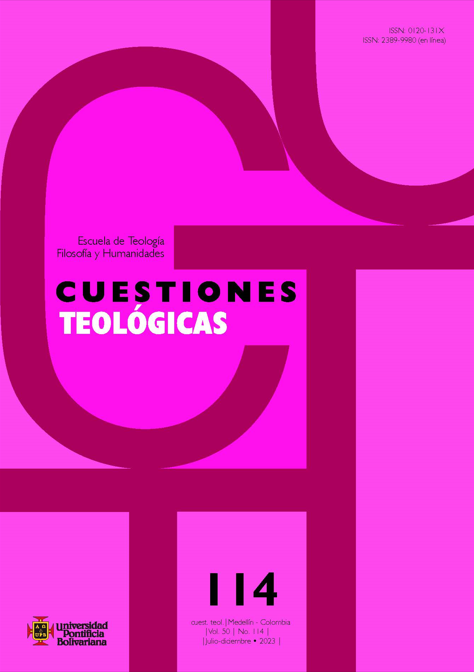Christian existence as overcoming worldly concern. A hermeneutic-phenomenological approach to The Lily of the Field and the Bird of the Air, by Søren Kierkegaard
Main Article Content
Abstract
This article constitutes a hermeneutic-phenomenological approach to Kierkegaard's The Lily of the Field and the Bird of the Air. The purpose of these pages is to reveal the essential features of Christian existence as a mode of factual life. In the first section, the condition of possibility and the characteristics and ethical implications of the latter are exhibited. The second reflects on the alternative of following Christ or opting for the search for recognition. The third section shows that the imitation of Christ is the only way to become oneself. The thesis that we want to demonstrate is that Christianity is the form of existence that allows us to overcome worldly concern.
References
Aucar, M. (2021). Ser sí mismo auténtico. Existencia, facticidad e instante. Studia Heideggeriana, X, 19-109.
Arendt, H. (2001). El concepto de amor en san Agustín. Madrid: Ediciones Encuentro.
Binetti, M. J. (2005), Tiempo y eternidad en el pensamiento kierkegaardiano. Enfoques, XVII (2), 109-122.
Damgaard, I. (2007). The Danger of the Restless Mentality of Comparison. En N. Jørgen Cappelørn, H. Deuser & B. Söderquist [comps.], Kierkegaard Studies Yearbook (193-208). Berlin: De Gruyter.
De la Cruz, san Juan (1994). Subida del Monte Carmelo. En Obras Completas (241-482). Madrid: Biblioteca de Autores Cristianos.
De Hipona, san Agustín (2003). Homilías sobre la primera carta de San Juan a los Partos. (445-490). Madrid: Biblioteca de Autores Cristianos.
De Hipona, san Agustín (2005). Tratados sobre el Evangelio según san Juan (1°): 1-35. Obras Completas de san Agustín. XIII. Madrid: Biblioteca de Autores Cristianos.
Evans, S. (2009). Kierkegaard. An Introduction. Cambridge: Cambridge University Press.
García-Baró, M. (2004). Más yo que yo mismo. Un ensayo fundamental de la filosofía de la mística. En J. Martín Velasco (ed.), La experiencia mística. Estudio Interdisciplinar (285-309). Madrid: Trotta.
Garrido, Á. (2021a). Del paganismo a la gracia: una interpretación filosófica de la existencia religiosa en el pensamiento de S. Kierkegaard. Cuadernos Salmantinos de Filosofía, 48, 399-419.
Garrido, Á. (2021b). La alegría de ser nada. La dádiva perfecta y la existencia capaz de recibirla en los Discursos edificantes de Søren Kierkegaard. Franciscanum 175 (63), 1-19.
Garrido, Á. (2020). La existencia y el cielo. Observaciones acerca de la relación entre existencia y obediencia a partir del pensamiento de S. Kierkegaard. Tópicos. Revista de Filosofía, 58, 83-107.
González, L. (2021), Cristianismo versus cristiandad. La dimensión edificante de la filosofía de Søren Kierkegaard. Revista de Filosofía, 53, 14-43.
Grøn, A. (2000). Kierkegaard. Ética de la subjetividad. El Garabato, 12, 1-6
Guerrero, L. (2004). La verdad subjetiva. Søren Kierkegaard como escritor. Universidad Iberoamericana: México.
Heidegger, M. (1997). Estudios de mística medieval. Madrid: Siruela.
Heidegger, M. (2000a). Introducción a la fenomenología de la religión. México: Siruela- Fondo de Cultura Económica.
Heidegger, M. (2000b). Ontología. Hermenéutica de la facticidad. Madrid: Alianza Editorial.
Johnson, R. (2020). The Ministering Critic: Kierkegaard’s Theology of Communication. Religions, 11 (35). https://doi.org/10.3390/rel11010035.
Kierkegaard, S. (1984). La enfermedad mortal o De la desesperación y el pecado. Madrid: Sarpe.
Kierkegaard, S. (1963). Los lirios del campo y las aves del cielo. Tres discursos religiosos. Madrid: Ediciones Guadarrama.
Kierkegaard, S. (1983). Mi punto de vista. Madrid: Aguilar.
Kierkegaard, S. (2010). Post-scriptum no científico y definitivo a “Migajas filosóficas”. Salamanca: Sígueme.
Kierkegaard, S. (2008). Postscriptum no científico y definitivo a Migajas filosóficas. México: Universidad Iberoamericana.
León-Dufour, X. (1989). Lectura del evangelio de Juan. Jn 1-4. Vo. I. Salamanca: Sígueme.
Moltmann, J. (2010). El dios Crucificado. Salamanca: Sígueme.
Negre, M. (1988), Fundamentación ontológica del sujeto en Kierkegaard. Anuario Filosófico, 21, 51–72.
Pattison, G. (2002). Kierkegaard’s Upbuilding Discourses: Philosophy, Literature and Theology. USA- Canada: Routledge Studies in Nineteenth-Century Phisosophy.
Rodríguez, P. (2021). Autoconservación y trabajo desde la perspectiva edificante de Kierkegaard. Análisis de Lo que aprendemos de los lirios del campo y las aves del cielo (1847)». Franciscanum, 175, 1-23.
Stein, E. (2010). La filosofía existencial de Martín Heidegger. Madrid: Trotta.
Torralba, F. (2016). La esencia del amor en Kierkegaard. Interpretación de Las obras del amor (1847), Pensamiento, 271, 411-429.
Torralba, F. (2019). Deconstruir la cristiandad. A vueltas con Kierkegaard. Estudios Kierkegaardianos. Revista de filosofía, 5, 65-71.
Westphal, M. (2011). Kierkegaard on Faith, Reason, and Passion. Faith and Philosophy: Journal of the Society of Christian Philosopers, 28, 82-92.






